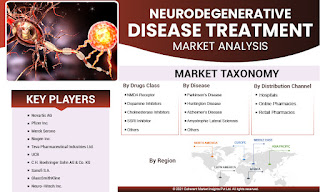Advances in Neurodegenerative Disease Therapies: Current Approaches and Future Directions
Neurodegenerative diseases are a group of debilitating
disorders characterized by the progressive degeneration of nerve cells in the
brain or spinal cord. They include conditions like Alzheimer's disease,
Parkinson's disease, Huntington's disease, and amyotrophic lateral sclerosis
(ALS), among others. Despite the challenges posed by these complex disorders,
there have been significant advances in therapies, both in the present and on
the horizon, that offer hope for patients and their families.
Current Approaches:
- Pharmacological
Interventions: The development of disease-modifying drugs has been a
key focus in neurodegenerative disease research. Scientists have made
strides in understanding the underlying molecular mechanisms, leading to
the identification of potential targets. Drugs that aim to clear abnormal
protein aggregates, reduce inflammation, or improve neuronal communication
are being investigated in clinical trials. While progress has been made,
challenges in drug delivery and precise targeting of affected brain
regions remain.
- Gene
Therapies: Gene editing technologies, like CRISPR-Cas9, have opened up
new avenues for treating neurodegenerative
diseases caused by genetic mutations. Researchers are exploring ways
to correct or replace faulty genes associated with these disorders. Gene
therapy holds the potential to provide long-lasting and even curative
effects for some patients.
- Stem
Cell Therapy: Stem cells offer the promise of regenerating damaged or
lost neurons in the brain. Researchers are studying how to harness the
potential of stem cells to replace the dysfunctional cells and restore
brain function. However, challenges related to cell survival, integration,
and potential side effects need to be carefully addressed before this
approach can be widely applied.
Future Directions:
- Precision
Medicine: As our understanding of the genetic and molecular basis of
neurodegenerative diseases improves, personalized treatments tailored to
an individual's specific condition will become a reality. Biomarkers and
genetic profiling will help identify patients who are most likely to
respond to particular therapies, optimizing treatment outcomes.
- Emerging
Therapeutic Targets: Novel therapeutic targets are constantly being
discovered through innovative research. One example is the gut-brain axis,
which has been implicated in some neurodegenerative diseases. Modulating
the gut microbiome or targeting gut-derived toxins could offer new avenues
for treatment.
- Nanotechnology:
Nanotechnology shows promise in drug delivery to the brain, enabling more
targeted and efficient delivery of therapies. Nanoparticles can carry
drugs across the blood-brain barrier, ensuring they reach their intended
site of action with reduced side effects.
- Immunotherapies:
Immunotherapies, such as monoclonal antibodies, have shown potential in
clearing toxic protein aggregates in neurodegenerative diseases. Ongoing
research aims to optimize these approaches and explore novel
immunotherapeutic strategies.
- Artificial
Intelligence and Machine Learning: The integration of AI and machine
learning in healthcare has transformative potential for neurodegenerative
disease treatment. These technologies can aid in early diagnosis,
prediction of disease progression, and identification of suitable
treatment approaches based on a patient's unique characteristics.
In conclusion, the current landscape of neurodegenerative
disease therapies is marked by promising developments in pharmacology, gene
editing, and stem cell research. Looking to the future, precision medicine,
emerging therapeutic targets, nanotechnology, immunotherapies, and the
integration of AI hold great potential to revolutionize the treatment of these
devastating disorders.

Comments
Post a Comment